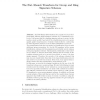Free Online Productivity Tools
i2Speak
i2Symbol
i2OCR
iTex2Img
iWeb2Print
iWeb2Shot
i2Type
iPdf2Split
iPdf2Merge
i2Bopomofo
i2Arabic
i2Style
i2Image
i2PDF
iLatex2Rtf
Sci2ools
107
click to vote
SCN
2010
Springer
2010
Springer
The Fiat-Shamir Transform for Group and Ring Signature Schemes
The Fiat-Shamir (FS) transform is a popular tool to produce particularly efficient digital signature schemes out of identification protocols. It is known that the resulting signature scheme is secure (in the random oracle model) if and only if the identification protocol is secure against passive impersonators. A similar results holds for constructing ID-based signature schemes out of ID-based identification protocols. The transformation had also been applied to identification protocols with additional privacy properties. So, via the FS transform, ad-hoc group identification schemes yield ring signatures and identity escrow schemes yield group signature schemes. Unfortunately, results akin to those above are not known to hold for these latter settings and the security of the resulting schemes needs to be proved from scratch, or worse, it is often simply assumed. Therefore, the security of the schemes obtained this way does not clearly follow from that of the base identification p...
Related Content
| Added | 30 Jan 2011 |
| Updated | 30 Jan 2011 |
| Type | Journal |
| Year | 2010 |
| Where | SCN |
| Authors | Ming-Feng Lee, Nigel P. Smart, Bogdan Warinschi |
Comments (0)

